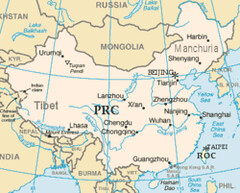Keywords: China, USA
Robert D. Kaplan writes for the June Atlantic Magazine:
"For some time now no navy or air force has posed a threat to the United States. Our only competition has been armies, whether conventional forces or guerrilla insurgencies. This will soon change. The Chinese navy is poised to push out into the Pacific—and when it does, it will very quickly encounter a U.S. Navy and Air Force unwilling to budge from the coastal shelf of the Asian mainland. It's not hard to imagine the result: a replay of the decades-long Cold War, with a center of gravity not in the heart of Europe but, rather, among Pacific atolls that were last in the news when the Marines stormed them in World War II. In the coming decades China will play an asymmetric back-and-forth game with us in the Pacific, taking advantage not only of its vast coastline but also of its rear base—stretching far back into Central Asia—from which it may eventually be able to lob missiles accurately at moving ships in the Pacific.
In any naval encounter China will have distinct advantages over the United States, even if it lags in technological military prowess. It has the benefit, for one thing, of sheer proximity. Its military is an avid student of the competition, and a fast learner. It has growing increments of "soft" power that demonstrate a particular gift for adaptation. While stateless terrorists fill security vacuums, the Chinese fill economic ones. All over the globe, in such disparate places as the troubled Pacific Island states of Oceania, the Panama Canal zone, and out-of-the-way African nations, the Chinese are becoming masters of indirect influence—by establishing business communities and diplomatic outposts, by negotiating construction and trade agreements. Pulsing with consumer and martial energy, and boasting a peasantry that, unlike others in history, is overwhelmingly literate, China constitutes the principal conventional threat to America's liberal imperium.
How should the United States prepare to respond to challenges in the Pacific? To understand the dynamics of this second Cold War—which will link China and the United States in a future that may stretch over several generations—it is essential to understand certain things about the first Cold War, and about the current predicament of the North Atlantic Treaty Organization, the institution set up to fight that conflict. This is a story about military strategy and tactics, with some counterintuitive twists and turns."
Link
Source: Theory B
Discussion:
AlwaysOn
See also:
Hubbert peak - Wikipedia
The Global War of the 21st Century - The World 2 Come
Blogs:
Thomas Barnett
Audio:
U.S. Congressman Roscoe Bartlett speaks about his speeches on peak oil - Global Public Media
Book:
The Chinese Century - Moore's Lore

No comments:
Post a Comment